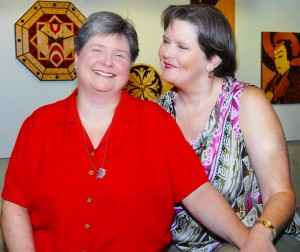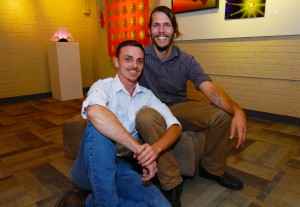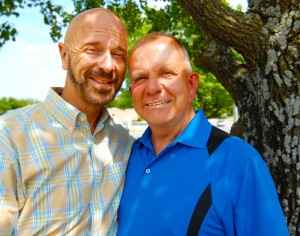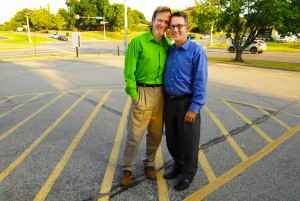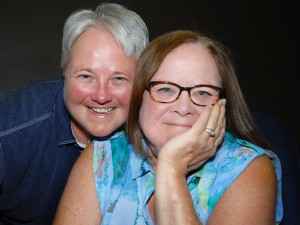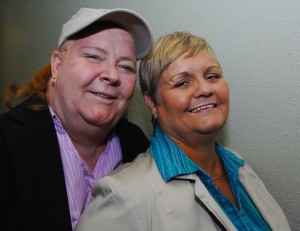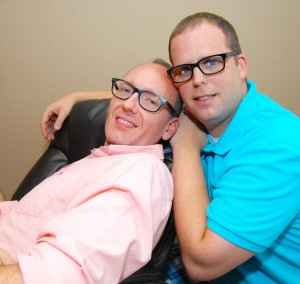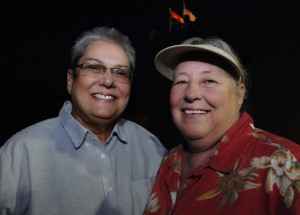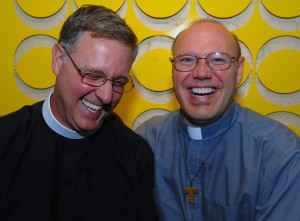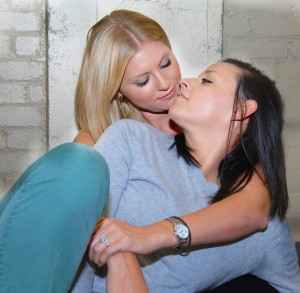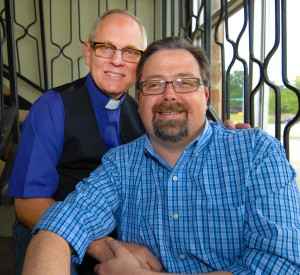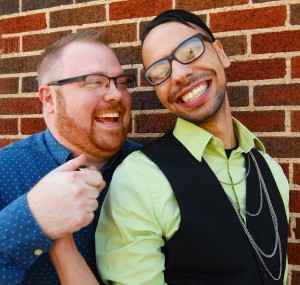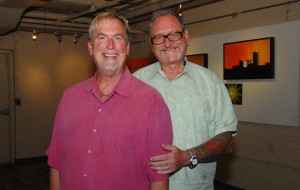Story & Photographs by M. Scott Carter
TULSA -- Dewayne is a priest. Aubrey retired from the military. Mary and Sharon are journalists. Kirk works for the state.
Laura wants children. Neill is a pastor.
Jesse is a musician. Angela has her doctorate.
Some are professionals; a few are homemakers. Some have retired.
All of them were recently married.
For 13 Oklahoma couples the argument over marriage equality wasn’t just about the Constitution, states’ rights or the rule of the judiciary in policy making. Instead, for these men and women, the entire debate over same-sex marriage came down to a single, four-letter word.
Love.
“I never expected to be able to get married," Mary Bishop-Baldwin of Tulsa. "I would go to friends’ weddings and I’d cry. I thought, ‘I’ll never have this. I’ll never be able to get married.”
Though she found the love of her life Mary Bishop-Baldwin knew that marriage in her home state of Oklahoma was out of the question.
In fact, not only did Oklahoma prevent same sex couples from marrying, but several members of the Oklahoma Legislature vilified those couples. In 2004 voters, led by legislative conservatives, passed an amendment to the Oklahoma Constitution that stated marriage was defined as a union between a man and a woman and outlawed same sex marriages.
The amendment stopped efforts to legalize same-sex unions in Oklahoma – for a while.
But Bishop-Baldwin and others refused to stand still.
More than a decade ago, Mary Bishop-Baldwin and her wife, Sharon along with co-plaintiffs Gay Phillips and Sue Barton filed a federal lawsuit seeking to overturn Oklahoma’s constitutional ban on same-sex marriage and to have out-of-state same-sex marriages recognized in Oklahoma.
That lawsuit, which eventually reached the 10 Circuit Court of Appeals, overturned Oklahoma’s ban on same sex marriage.
In June, the U.S. Supreme Court said states could not prevent same-sex marriages. At that moment, more than a decade after Oklahoma tried to stop same sex couples from marrying, the world changed.
The reaction was both euphoric and negative.
“I’m pretty optimistic,” said Lori Walke, pastor of Oklahoma City’s Mayflower Congregational Church. “I think that people needed to be given permission to show their love publicly and now they have been given permission to do that.”
Oklahoma’s governor, however, took a different tone.
“Today's decision has been cast by the media as a victory for gay rights,” Republican Gov. Mary Fallin said in a media statement issued shortly after the ruling. “What has been ignored, however, is the right of Oklahomans and Americans in every state, to write their own laws and govern themselves as they see fit. Those rights have once again been trampled by an arrogant, out-of-control federal government that wants to substitute Oklahoma values with Washington, D.C. values.”
Though marriage is now legal, the struggle continues.
Same sex couples seeking to marry will continue to face legal obstacles, said Brady Henderson, Legal Director for the American Civil Liberties Union of Oklahoma.
“Yes same sex marriage is now legal, but the challenges remain,” Henderson said. “We will see challenges in other areas of law such as family law, inheritance, parental rights and laws governing the workplace.”
Those challenges include changing laws such as those covering parental rights for same sex couples, he said. “The law hasn’t been fully developed yet.”
In many areas of the country – including Oklahoma – a person in a same-sex marriage could be fired from their job for simply being gay. In Oklahoma, employees have little recourse, he said.
At least one state lawmaker said she expects pushback from the court’s decision to continue. State Rep. Emily Virgin, D-Norman, said she remains concerned that same-sex couples could face discrimination.
“I believe we’ll see some fights about non-discrimination. The most powerful stories I’ve seen are the ones that talk about getting married in the morning and losing your job that evening.”
Virgin said Oklahoma is poised for a second debate on same-sex marriage: the rights of the LGBT community versus those individuals who say their religious freedom is being harmed.
“We saw it last session,” she said. “I think next year we’re going to be dealing with the same thing.”
Still, this summer’s ruling by the high court has given many in the LGBT community and their allies a reason to smile. And though the debate over same-sex marriage and issues surrounding it will continue, Henderson said that, eventually, same-sex marriages will become as common and accepted as those of the opposite sex.
“The big legal battle is over; there is no more same-sex marriage or opposite-sex marriage, there is just marriage,” he said. “Now we’re working to change culture.”
A cultural change, 13 couples believe, that should be based on love, a powerful four-letter word.
The Portraits
Mary and Sharon Bishop-Baldwin
About 20 years ago a newspaper brought Mary and Sharon Bishop-Baldwin together. Sharon began working at The Tulsa World in 1993. Mary began working at the newspaper in 1995. Not long after that, they started a relationship.
By 1996 they had fallen in love and were living together. A commitment ceremony followed in 2000. They wanted to get married but at that time it was not possible in Oklahoma.
In 2004 the women decided to push back. They launched a legal challenge that, over time, would bring down Oklahoma’s ban on same-sex marriages.
“I never expected to be able to get married,” said Mary Bishop Baldwin. “I’d go to friends’ weddings and I’d just cry. I didn’t think I could ever have anything like that.”
Each American, Mary said, should have the same civil rights.
“When the Constitution says that everyone should be treated equally under the law – that doesn’t just apply to straight white men,” she said.
After fighting the law against same sex marriages for more than a decade, Mary and Sharon would watch the prohibition fall. In January 2014, federal judge Terance Kern ruled in their favor. Six months later, in July 2014, the 10th Circuit Court of Appeals upheld Kern's ruling.
On October 6, 2014, Mary and Sharon were officially married in Oklahoma -- a day both women had spent years working toward.
“It (the legal fight) has enriched our lives,” Mary said. “So many people who supported us came out of the woodwork – not just from Oklahoma but from all over the country. We still have messages on our answering machine from the day after we filed the lawsuit.”
David and Jason Bragg-Sutton
David and Jason Bragg-Sutton started their relationship as friends; it got serious later. Today the pair and their three children live in the small town of Nowata, in Washington County.
“I always wanted to be a parent,” Jason said. “I knew early on that was something that was important to me.”
Parenting three small children isn’t the only obstacles the pair faced.
“W have the typical problems,” David said. “This is Oklahoma. We’re in the Bible Belt. Of course, there is some prejudice and bigotry out there, but we’ve been well insulated by our families.”
And, because they felt so deeply about family they decided to adopt – three children from the Department of Human Services’ foster care program.
"There was a lot involved, but adoption wasn't difficult," Jason said. "But we will have to do a step parent adoption."
David calls that a "technical issue."
Even with those hurdles, David and Jason, with help from their immediate families and the “bubble of supportive people” around them, have built their family and their life together. Both men say the rough spots have been smoothed over, but like other same-sex couples, they believe there is more work to be done before the LGBT community will be on equal footing with the rest of the state.
“There are things still out there,” Jason said. “Legal, employment, family law, things like that."
There's also prejudice -- just under the surface -- that remains. "You don't see the signs that say 'No Gays,'" David said. "Instead, it's the silent treatment."
With their children content and happy, David and Jason say they remain optimistic about the future.
"We're moving toward a world where people are accepted for who they are," David said. "We're not there, but we're moving that way."
Ray Freer and Aubrey Nash
In 1990, Ray Freer met a young man at a church retreat. During the retreat, the person leading a discussion told the group, “AIDS was God’s punishment for homosexuality.” Ray watched the young man run from the room.
Ray followed the man and tried to comfort him. Ray and the young man, Chad became close friends.
Eight months later, Chad died.
It was at that moment that point, that Ray, a retired Air Force officer, decided he needed to help. "At that time I wasn't ready to accept you could be gay and Christian."
A short time later, Ray was transferred to Ft. Worth where he joined an AIDS Service Organization as a care contact. At that first meeting, he met Aubrey.
"I have to say the second I saw him, I was enormously smitten," he said.
Aubrey, also retired from the Air Force, worked for the postal service. But he wasn't too sure about Ray. In fact, it wan't until the last day of the training seminar that Aubrey agreed to a date. A second date followed. Then a third. After that third date, he said, they have been inseparable. About eight months later, in 1992, they had a commitment ceremony. "We went and got married and went on with our life," he said.
Their relationship would take them all over the country. Eventually they came to Oklahoma.
"That's when I told Ray we're not moving any more until I retire from the post office," Aubrey said.
Since then, Oklahoma has been home.
John Beebe and Kirk Martin
John and Kirk met in a parking lot.
Twenty-two years later they got married.
“Our original plan was to get married in California,” Kirk said. “Then the law changed in New Mexico and we both love Santa Fe, so we made plans.”
They picked an anniversary important to both of them – June 28th, the day of the 1969 Stonewall uprising.
“We never though it would be legal in Oklahoma,” John said. “Had we known we may have waited – gotten married in our home state – but we’re both glad we got married where we like to vacation.”
Today, the pair, both working professionals, said their lives are content and happy. Yet they also remain concerned about what the future will hold for the LGBT community.
“Progress happened at a lot more rapid rate than I expected,” Kirk said. "But that progress has yet to fully recognize the transgender community."
Angela Sivadon and Mary Robinson Sivadon
Almost three decades ago, Mary and Angela began their relationship like many others do – over the telephone.
Professional colleagues, they spent three months on the telephone before they met in person.
"We were in charge of this committee so we actually talked two or three times each week," Angela said. "A few months later we put the face with the voice."
Now friends, after their in-person meeting, Angela began babysitting Mary's two young sons.
“I found myself coming home earlier and earlier because we all had such a good time together, ” Mary said.
In January, the pair married.
"It's real funny, I never really was a proponent of (same sex) marriage," Angela said. "That's probably because it wasn't available to me -- I mean for anybody. I wan't big on being married period. It it wasn't going to be legal and I wouldn't be able to get those benefits, then there really wasn't any reason for me to do it."
Angela's attitude changed in June.
"Once we got married in January, it elevated our relationship to a whole new level, even after all that time," she said.
Mary agreed. "There is just a sweetness to being married," she said.
Diana and Nancy Kunkle
Diana and Nancy Kunkle met because they both like to fish.
They met, Diana said, back on a computer when it wasn't cool.
"For about three or four months, we communicated on computer, then on the telephone," Diana said.
Slowly, a relationship developed -- and for more than a decade, they were a very typical couple
Then things changed.
"When we got married it was as man and wife," Diana said. "Thirteen years later I came out to her that I was transgender and she said, 'well, we'll just go down and transition together then.'"
For Nancy, it wasn't that easy.
"It's definitely been tough," Nancy said. "When we first married, everything was great. We knew we had found each other as soul mates as man and wife. Later I began to find things and realized 'maybe there is something that he wasn't telling me.'"
Then Diana brought Nancy a letter.
"She said just read it, then we'll talk," Nancy said. "It was a four page letter and she just laid her soul there and just laid it all out. From her earliest memories of wanting to be female. From the day we had first married, all the years between then and even up to the day she gave me a letter."
Neither of them could have made it through the issue verbally, Nancy said. "We would have screamed and cried and had a nervous breakdown," she said. "But with the letter we got though it. There were still lots of tears."
At that point, Nancy went to Diana and said, "what's next?"
Though the dynamics of their relationship have changed a great deal, Nancy has discovered she is very protective of Diana.
"Now it's kind of switched," Diana said. "She makes sure no one messes with me."
We're not different than anyone else, Diana said. "I live. I love. I laugh. I love God. I love my wife. We're no different than anyone else."
Shawn and Brandon Cannon-McFadden
Shawn and Brandon met though a mutual friend -- who wasn't sure that Shawn was gay.
"This girl would come to my door and she had these little grins and I thought I was going to have to break her heart," Shawn said. "I thought she was hitting on me."
She wasn't.
Instead, the young woman wanted to introduce Shawn to Brandon.
But neither Shawn nor Brandon was ready for a relationship. In fact, Shawn said he only took Brandon's telephone number to get the girl to stop.
"Finally, I told her fine, just give me his number," Shawn said.
the number was changed, followed by a few days of texting. Then Shawn and Brandon began to talk.
From talking, they moved to dating.
In 2013, Shawn and Brandon got married in Seattle, Washington.
But Shawn and Brandon didn't stay in Seattle. Instead they came home to Oklahoma, knowing that their marriage would not be recognized.
"We stayed in Oklahoma because its where our family is. It's where our work is. It's where our friends live," Shawn said. "Oklahoma is home."
But living in the Sooner State wasn't easy, Brandon said. Growing up in Hugo, Brandon said he experienced violence and prejudice because he was gay.
"I grew up in a small town in southeast Okahoma and that was difficult," he said. "I grew up in the 90s and I grew up a gay kid. Going through the things that I did then and being where I am at now, it's a completely different spectrum. I learned how to fight. I learned how to stand up for myself and I was not going to be bullied."
As a result, he said, he made friends. "Having gone through that I'm grateful for the progress," he said.
But the struggle for LGBT equality remains.
"As good hearted as people in Oklahoma are, there are some serious issues that remain," Shawn said. "Things like aversion therapy. There are problems in housing and employment. We have friends that struggle with those things every day."
As for Brandon, the fight isn't about violence but policy.
"There will always be those people (opponents) out there," Brandon said. "But I'm not as afraid as I used to be."
Sue Barton and Gay Phillips
Sue Barton and Gay Phillips weren’t trying to change the world -- just their little corner of it.
Co-plaintiffs in the lawsuit, Bishop versus United States, the women were seeking to have their marriage recognized in Oklahoma. The lawsuit's other plaintiffs, Mary and Sharon Baldwin-Bishop, had asked the court to strike down bans on same-sex marriage in Oklahoma.
And though the fight for marriage equality has been a long, and at times frustrating road for the women, the results Sue said, were worth the wait.
“I think there is a point in everyone’s life when you realize it’s just your turn,” Sue said. "This time it was step up and put your money where your mouth is."
They also went it alone.
While national human rights organizations backed away from supporting the pair's lawsuit, both women remained focused and continued their legal effort for change.
"It was ugly, to start," Sue said.
Following a successful ruing by a federal judge in Oklahoma, the United State's Supreme Court overturned state bans against same-sex marriage. Today, though both woman are known nationwide for their fight for marriage equality, Sue and Gay say they would rather be seen as an example of a healthy, long-term relationship.
"Do we consider ourselves role models?" Sue said. "Not really. We're just a regular, old couple, sitting on the sofa watching television."
Father Dwayne Messenger and Ray Knapp
Dewayne Messenger came to Oklahoma so Dewayne could lead St. Jerome’s Church in Tulsa. Ray Knapp came with him.
But long before their arrival in Tulsa, Dwayne and Ray – both retired from the military – had been deeply involved in their church and in the faith community.
They met in Dallas on Halloween night. Over the course of what Dewayne describes as several conversations, both men came to understand the other's faith.
"We were very involved in our own churches," Dewayne said. "We both realized we were both committed to church and that was very important to us."
After several dates, Ray was invited to go full-time on active duty so the men moved to Washington, D.C. Then to Dallas. Then back to Washington, D.C.
"It was in Washington, D.C. the second time, I discerned a call to ordained ministry and began perusing that," Dewayne said.
After establishing a church in Redding, Penn and living out of suitcases for several years, both men jumped at the chance to come to Tulsa. "Church has always been a very important part of my life," Ray said.
Now, even with same-sex marriage legal in the United States, both Dewayne and Ray believe that issues remains. "It's a lot like a checkerboard," Dewayne said. "When we bought a house and had work done here, no one batted an eye," he said. "But if we were an hour a way, things would be different."
Ray agreed. "Like racial discrimination, it's going to take a while. It may take a long time before things fully change."
Jennifer and Laura Van Burkleo
Life wasn't for Laura Van Burkleo.
After the loss of father at a young age, Laura worked two jobs during high school to take care of herself.
A few years later she met Jennifer and Laura knew she'd found the family she had always wanted.
But getting Jennifer's attention wasn't easy.
A missed first date. Snarky text messages and some less-than-friendly exchanges between both women didn't make for a good beginning.
Then Laura took a step back.
"I apologized, then I backtracked and then our conversation went from talking about that (their previous issues) to just talking about life. The connection was unreal," she said.
Things changed on the Fourth of July.
"I was freaking out," she said. "I changed like six times. I'm 28-years old, freaking out on a first date. Then I went over there and knocked on the door and it was perfect."
That first date, she said, was life-changing.
"I've never really had a home," Laura said. "I grew up pretty rough. I worked two jobs most of the time, but standing there with her was the most calming feeling in the world. This woman is where my home is."
The next morning Laura told Jennifer how she felt.
"I'd never had anyone talk to me on such a different level," Jennifer said. "She was the first person to ask about my family and my past and things that really mattered to me. I've never really had that happen before. I felt like our foundation from the very beginning was stronger than anything I'd ever had."
Laura also broke down emotional walls, Jennifer said.
Ninety-two days after that first day, they were married.
"I wake up feeling more blessed every day," Jennifer said.
Neill and Dean Coffman
Neill Coffman is the pastor of Expressions Church in Oklahoma City.
Dean Coffman is an information technology architect.
After being introduced to Dean a good friend from church, Neill said he saw Dean and knew “this is my partner.”
A few telephone calls later, they went on their first date.
"We've been together pretty much since that date," Neill said. "We got engaged, then ended up getting married."
The men also raised Neill's two children from his previous marriage and during their spare time, started a church. "We started (the church) in our living room eight years ago, and that became Expressions Church," Neill said.
After a commitment ceremony, the men married in California in 2008. "Our marriage has been like a set of stairs," Dean said. "We were married in front of our friends in family in 2007. In 2008 we were married in the state of California."
Their relationship, Dean said, followed the changes in marriage laws across the county.
In 2014, Oklahoma was forced to recognized same-sex marriages, after a ruling by the United States Supreme Court. "I was able to get on insurance," Neill said. "Prior to that we had to do tons and legal contracts and wills and forms and trusts to kind of emulate (a marriage contract). It was really hard."
Oklahoma's recognition of same-sex marriages was a game-changer, Dean said.
"We were finally safe in this state," he said. "When the court affirmed gay marriage rights it was a sigh of relief. It meant we could go anywhere in this country and, in theory, not have our status questioned."
But issues remains. Even today, Dean said, some spots of the country continue to refuse to issue marriage licenses.
"You still have that happening today," Dean said. "We saw that during the last legislative session. They said, now we have to recognize same-sex marriage but we don't have to make it easy on them. If it wasn't a question of discriminatory practices before it suddenly is now. It's evident. It's very discriminatory."
And though there has been some positive change, Dean said many legal and workplace issues will continue.
"You still have companies in Oklahoma where people can have their employment terminated just because of their status," he said. "I see that changing, but it's going to be a battle."
Patrick French and Jesse Wilson
An ice storm brought Jesse Wilson and Patrick French together.
Jesse, a musician, met Patrick, a telecom professional, after both men ended up at the same club. An ice storm in 2007 had killed most of the power in the Tulsa area, but at one club the electricity remained on.
"I'd been working sunrise to sunset," Patrick said. "I'd gotten word that Club Majestic had electricity. So I thought I'm going to go out."
Jesse, a college student at the time, decided to go with this friends to the same club.
"I saw Jesse across the bar," Patrick said. "So I went over and struck up a conversation."
Patrick asked Jesse what instrument he played. And that first conversation led to an evening-long discussion.
"We talked all night long," Jesse said. "We went to breakfast the next morning."
Five years later, in October 2012, they got married.
"I made it through college with one boyfriend," Jesse said. "That was a feat."
Like many others, their relationship has had its challenges, but both men say their relationship has become stronger over the years.
"There is this idea that society kind of projects about what our relationship should be," Patrick said. "I think a lot of people set themselves up for failure in a relationship because they aspire to have a relationship like somebody else. I think that was potentially some of the stumbling blocks early on, just assuming that it had to be a certain way."
The success, Patrick said, came from being in love with what they are and not, necessarily what someone else thinks it should be.
"It (their marriage) hasn't been perfect, but I don't want it to be," he said.
Kelly Kirby and Charles Johnson
Kelly Kirby and Charles Johnson met via a computer network.
Four years later they met in person.
Kelly, an accountant said he met Charles, a music teacher, on-line in 1995. Both men were married previously to women and both have children. Both were divorced in 1990.
"We were both raising teenagers at that time," Kelly said. "We were single and not looking for a relationship."
After the first date, they talked for hours. A week later the went out again.
In 2008, they were married in San Diego.
"Between a decision by the California Supreme Court and the Prop 8 vote, there was a five-month window," Kelly said. "We have what we call a limited edition license."
Even though the men were legally married in California, it wasn't until 2014 that their marriage was legal in Oklahoma.
"Before that, all of the rights that straight married people had, we had to do those one at a time," Charles said. "That all became moot last October."
After being fired by a client in 1992, Kelly said he took his accounting practice in a new direction, focused on the gay community. "I'd always been open," he said. "But after last year's ruling, I found myself talking about being married. I felt more safe in saying it in a room full of strangers. I still surprised myself by how much more free I felt. I felt free to say it."
Charles said he, too, has experienced discrimination at work. After bing pushed out of an previous teaching job, he moved to Tulsa and started over.
"I love my job," Charles said. "It feels really, really good to work in a building (where he is accepted). Occasionally a parent will call but the principal says, 'isn't this a good opportunity for you to teach your child that not everyone has to be the same way and we can work together?' It's a very secure satisfying place to work."
